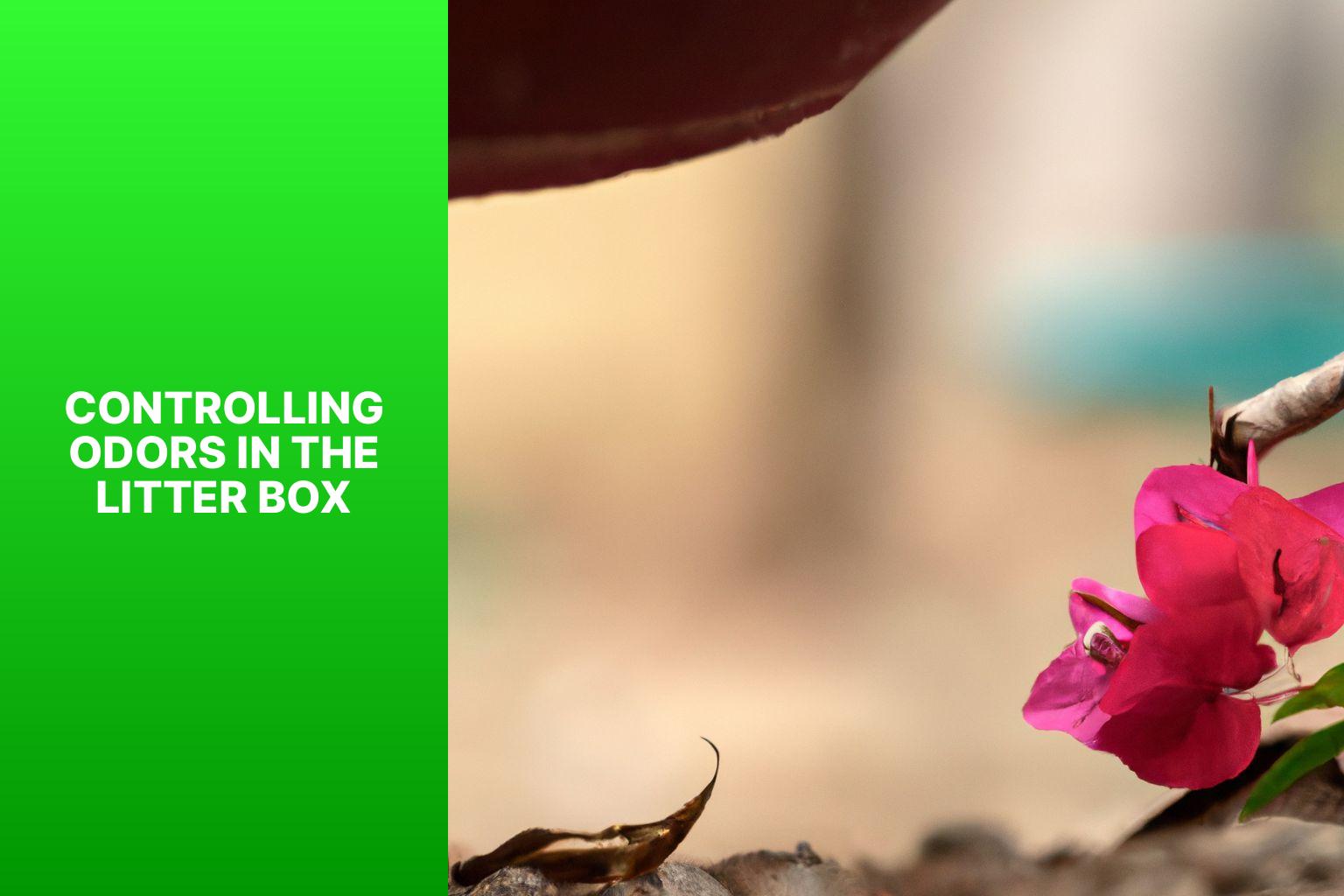Understanding the Smell: Why Does My Cat Smell Like Poop?
If you’ve noticed that your cat has an unpleasant odor resembling that of feces, you may be wondering what could be causing this issue. There are several possible reasons behind why your cat smells like poop.
Poor Hygiene and Grooming: Cats are known for being meticulous groomers, but sometimes they may not be able to properly clean themselves, leading to an accumulation of waste in their fur.
Dietary Issues and Digestive Problems: The food your cat consumes can affect the smell of their waste. Poor diet choices or digestive problems can contribute to foul-smelling stool.
Anal Gland Problems: Cats have scent glands near their anus that can produce a strong odor if they become impacted or infected.
Urinary Tract Infections: Infections in the urinary tract can cause changes in urine odor, which may be mistaken for a fecal smell.
Other Medical Conditions: Various medical conditions, such as gastrointestinal issues or anal sac disease, can also result in an unpleasant odor emanating from your cat.
It’s important to pay attention to any changes in your cat’s behavior or eating habits, as well as signs of discomfort or pain. If the smell persists or if you notice any concerning symptoms, seeking veterinary assistance is recommended to properly diagnose and address the underlying cause.
In terms of prevention and treatment, ensuring proper hygiene and grooming practices for your cat is essential. choosing a balanced and digestible diet can help improve the quality of their waste. Regular veterinary check-ups can help identify any potential issues early on, while treatment of underlying medical conditions may be necessary to eliminate the odor completely.
By understanding the possible causes and taking appropriate measures, you can address the issue of your cat smelling like poop and ensure their overall health and well-being.
Key takeaway:
- Understanding the Smell: There are various reasons why your cat may smell like poop, including poor hygiene, dietary issues, anal gland problems, urinary tract infections, and other medical conditions.
- When to Seek Veterinary Assistance: If your cat’s odor persists, if there are changes in behavior or eating habits, if there are symptoms of discomfort or pain, or if your cat excessively licks or scoots, it is important to seek veterinary assistance.
- Prevention and Treatment of the Odor: Proper cat hygiene and grooming, choosing a balanced and digestible diet, regular veterinary check-ups, and treating underlying medical conditions can help prevent and treat the odor.
Understanding the Smell: Why Does My Cat Smell Like Poop?
Curious about why your four-legged friend has an unpleasant odor? Let’s dive into the intriguing realm of cat smells and focus on one puzzling question: why does my cat smell like poop? We’ll uncover the possible causes behind this less-than-pleasant scent. From poor hygiene and grooming habits to dietary issues, digestive problems, and even medical conditions, we’ll explore the potential factors that could be contributing to your cat’s odorous predicament. Get ready to sniff out some answers!
Possible Causes of the Foul Odor
The foul odor from a cat can have multiple causes including poor hygiene and grooming practices, dietary issues and digestive problems, anal gland problems, urinary tract infections, and other medical conditions.
If a cat doesn’t clean itself regularly, dirt, feces, or urine can accumulate on its fur, causing a smell. Certain foods can upset the stomach, causing foul-smelling feces. Digestive disorders like malabsorption or inflammatory bowel disease can also contribute to an unpleasant odor. Cats have anal glands that produce a distinct-smelling fluid. If these glands become impacted or infected, it can result in a foul smell.
Infections in the urinary tract can affect the smell of urine, which can be perceived as foul. Other symptoms may include frequent urination or blood in the urine. Dental disease, ear infections, or skin infections can contribute to an unpleasant odor in cats.
If your cat has a foul odor, consult a veterinarian to determine the underlying cause and appropriate treatment. They can provide guidance on maintaining hygiene, selecting a balanced diet, and treating any medical conditions that may contribute to the odor. Regular veterinary check-ups are crucial for early detection and prevention of potential issues.
Poor Hygiene and Grooming
Poor hygiene and grooming are significant factors that can lead to a cat smelling like poop. It is crucial to maintain cleanliness in order to prevent odor problems. Take into consideration the following aspects:
– Infrequent bathing: While cats groom themselves, if they are unable to do so due to obesity, illness, or old age, feces and urine can accumulate on their fur, resulting in a foul smell.
– Lack of litter box cleanliness: Regularly cleaning the litter box is essential for hygiene. If it is not done frequently enough, the cat may step in waste and carry the odor on their paws and fur.
– Matting and dirty fur: Cats with long hair are more prone to matting, which can trap feces and lead to a persistent smell. Dirty fur can retain odor from accidents or the litter box.
– Oral hygiene: Poor dental health can cause bad breath and an unpleasant odor. Maintaining regular dental care, such as brushing their teeth and providing dental treats, is important to prevent this.
– Health issues: Poor hygiene and grooming habits can be an indication of underlying health problems. If your cat’s grooming behavior has changed or they are struggling to stay clean, it is advisable to consult a veterinarian to rule out any medical conditions.
By addressing poor hygiene and grooming, you can eliminate the unpleasant odor and create a healthier environment for your cat.
Dietary Issues and Digestive Problems
Dietary issues and digestive problems can cause odor in cats. Cats with imbalanced diets may experience gastrointestinal distress and nutrient malabsorption, resulting in smelly stools. It is crucial to provide cats with a diet that is rich in animal proteins. Feeding them low-quality commercial foods or high-carbohydrate human foods can disrupt their digestive system and worsen these issues.
To address these concerns effectively, consider implementing the following measures:
1. Provide proper nutrition: Make sure to feed your cat a high-quality, balanced diet that primarily consists of real meat. Avoid fillers or by-products that might compromise their digestive health.
2. Limit treats: Minimize the use of treats and refrain from feeding your cat human foods that can potentially upset their stomach.
3. Gradual transitions: When changing your cat’s diet, introduce new foods gradually over several days to prevent any digestive disturbances.
4. Ensure hydration: Always ensure that your cat has access to fresh water. This can help prevent dehydration and promote healthy digestion.
5. Consult a veterinarian: If your cat continues to experience digestive issues and unpleasant odor despite dietary changes, it is advisable to seek professional advice. A veterinarian can assess your cat’s specific needs and suggest appropriate dietary modifications or additional treatments.
It is important to remember that cats have a sensitive digestive system, and even minor dietary changes can significantly impact their overall health and well-being.
Anal Gland Problems
Anal gland problems can cause your cat to smell like poop. Consider these key points related to anal gland problems. Clogged or impacted anal glands can result in a foul odor. These glands, located near the anus, produce a smelly secretion expelled during bowel movements. If these glands are blocked or improperly emptied, they can become infected or inflamed, leading to a strong odor.
It is important to note that anal gland problems are more common in small dog breeds, but cats can also experience them. Signs of anal gland problems in cats include scooting, excessive licking of the anal area, discomfort or pain during defecation, and swelling or redness around the anus. If you suspect your cat has anal gland problems, it is recommended to seek veterinary assistance.
A veterinarian can examine the anal glands and determine the appropriate treatment, such as expressing the glands manually or prescribing medication. It is a fact that approximately 12-16% of cats will develop anal gland problems at some point in their lives, making it a common issue among feline pets.
Urinary Tract Infections
Urinary Tract Infections (UTIs) in cats cause a foul odor. Bacteria enter the urinary tract, inflaming and infecting it, resulting in a strong and unpleasant smell in your cat’s urine.
Symptoms of Urinary Tract Infections in cats include frequent urination, straining to urinate, blood in the urine, and excessive grooming of the genital area. If you notice any of these signs, seek veterinary assistance.
A veterinarian can diagnose Urinary Tract Infections through a physical examination and urine analysis. Treatment involves antibiotics to clear the infection. Complete the full course of medication as prescribed by your vet.
Prevent Urinary Tract Infections in cats by providing fresh water daily, feeding a balanced and high-quality diet, and ensuring proper hygiene of litter boxes. Regular veterinary check-ups can also detect any underlying health conditions that increase Urinary Tract Infection risk.
I had a cat named Whiskers who emitted a strong odor resembling poop. Concerned, I took her to the vet, who diagnosed her with a Urinary Tract Infection. After antibiotics and dietary changes, Whiskers fully recovered, and the foul odor disappeared. It taught me the importance of recognizing and treating Urinary Tract Infections in cats.
Other Medical Conditions
Other medical conditions, such as inflammatory bowel disease (IBD), pancreatitis, intestinal parasites, diabetes, and liver or kidney disease, can cause foul odors in cats. These conditions require attention and treatment to alleviate the smell. If you notice a persistent foul odor from your cat, it is important to consult a veterinarian. They can perform tests, diagnose the underlying condition, and recommend appropriate treatment options.
When to Seek Veterinary Assistance
If your feline friend has an unusual odor or is displaying concerning behaviors, it’s vital to know when it’s time to seek veterinary assistance. In this section, we’ll explore key indicators that shouldn’t be ignored. From persistent strong odors to changes in behavior or eating habits, we’ll cover the signs that may indicate a need for professional intervention. We’ll also address symptoms of discomfort or pain, as well as excessive licking or scooting, to help you determine when it’s best to consult with a veterinarian.
Persistent Strong Odor
Edited
Persistent Strong Odor
When your cat has a persistent strong odor, it’s important to address the issue promptly. Ignoring the smell may indicate an underlying problem that needs attention. Follow these steps to determine the cause and resolve the issue:
1. Evaluate hygiene: Keep your cat’s litter box clean and well-maintained. Regular scooping and changing of litter will prevent lingering odors.
2. Analyze diet: A balanced and digestible diet is crucial for your cat’s overall health and can help reduce body odor. Consult with your veterinarian to ensure you’re feeding your cat the right food.
3. Seek veterinary assistance: Persistent strong odors may indicate an underlying medical condition. If the smell persists despite proper hygiene and diet, consult with a veterinarian for a thorough examination.
4. Treat underlying medical conditions: Medical conditions like infections or digestive issues can cause strong odors in cats. Proper diagnosis and treatment from a veterinarian can help reduce the odor and improve your cat’s well-being.
Remember, don’t ignore a persistently strong odor. By addressing the problem promptly and seeking veterinary assistance, you can ensure your cat’s comfort and overall health.
Changes in Behavior or Eating Habits
Cats’ behavior or eating habits can indicate underlying health issues or discomfort. Pay attention to changes in behavior or eating habits and seek veterinary assistance if necessary.
- Inappetence: A sudden decrease in appetite or refusal to eat may signal various medical conditions, dental issues, or gastrointestinal problems.
- Increased thirst: Excessive thirst or frequent trips to the water bowl can indicate diabetes, kidney disease, or hyperthyroidism.
- Vomiting or diarrhea: Recurrent episodes of vomiting or diarrhea may result from dietary sensitivities, food allergies, gastrointestinal infections, or other digestive disorders.
- Sudden weight loss or gain: Significant changes in body weight can indicate thyroid problems, dental issues, or metabolic disorders.
- Changes in litter box behavior: Cats may urinate or defecate outside of the litter box, signaling urinary tract infections, bladder stones, or anxiety-related issues.
- Behavioral changes: Cats may display increased aggression, lethargy, excessive grooming, or avoidance behaviors when in pain or feeling unwell.
If you notice any of these changes in behavior or eating habits in your cat, consult a veterinarian. They can diagnose and treat underlying medical conditions and ensure your cat’s well-being.
Symptoms of Discomfort or Pain
– Cats experiencing discomfort or pain may exhibit more frequent or unusual vocalization patterns.
– Cats in pain may show a decrease in appetite or refusal to eat. They may also demonstrate changes in their drinking habits.
– Cats in pain may display a hunched or tense posture and have difficulty with movement.
– Pain can lead to increased irritability or aggression in cats. They may hiss, growl, or react negatively when touched or approached.
– Cats in pain may seek out unusual hiding spots and avoid social interaction.
– Cats in pain may exhibit changes in their litter box behavior, such as urinating or defecating outside the box or experiencing difficulty while doing so.
– Cats in pain may excessively groom themselves or focus on a specific area of their body. They may even engage in self-mutilation, such as biting or scratching the affected area.
– Pain can cause restlessness or increased lethargy in cats. They may struggle to settle down or sleep more than usual.
Excessive Licking or Scooting
Excessive licking or scooting in cats can indicate discomfort or an underlying medical condition. If your cat is exhibiting excessive licking or scooting, it is important to consult a veterinarian for a proper diagnosis and treatment. Possible causes of excessive licking or scooting in cats include anal sac impaction, parasites, skin allergies, urinary tract infections, and pain or discomfort in the rectal or hindquarter area.
If anal sacs are blocked or infected, cats may lick or scoot in an attempt to find relief. Fleas or mites can also lead to itching and irritation, resulting in excessive licking or scooting. Allergies to certain foods, triggers, or substances can cause cats to develop skin allergies, which can lead to itching and excessive grooming. Cats with urinary tract infections may excessively lick their genital area. Cats may lick or scoot if they are experiencing rectal or hindquarter pain or discomfort.
Treatment options for excessive licking or scooting may include medication for infection or inflammation, switching to a hypoallergenic or specialized diet, managing underlying medical conditions, and using soothing products such as medicated shampoos or sprays for itching. It is important to seek veterinary assistance to ensure the health and well-being of your cat, as excessive licking or scooting may indicate an underlying issue that requires medical attention.
Prevention and Treatment of the Odor
To help keep your feline friend smelling fresh, we’ll dive into the Prevention and Treatment of the Odor. From proper cat hygiene and grooming techniques to choosing a balanced and digestible diet, we’ll explore various ways to tackle this issue. We’ll touch upon the importance of regular veterinary check-ups and how they can contribute to combating unwanted odors. We’ll discuss the potential role of treating underlying medical conditions in keeping your cat smelling great. Let’s ensure your furry companion stays odor-free!
Proper Cat Hygiene and Grooming
Proper cat hygiene and grooming are essential for a pleasant smell and overall well-being. Ensuring proper cat hygiene and grooming should be a regular part of your pet care routine. By incorporating these four keywords – “Proper Cat Hygiene and Grooming” and maintaining cleanliness, you can promote a healthy and happy cat. Here are some important tips to consider:
1. Regular brushing: Brushing your cat’s fur removes loose hair, prevents matting, and distributes natural oils. This helps in maintaining proper cat hygiene and grooming, keeping them clean, and reducing odors.
2. Bathing when necessary: Occasional baths may be needed if your cat gets dirty or has a strong odor. It is important to use cat-friendly shampoo and warm water for proper cat hygiene and grooming. Don’t forget to rinse thoroughly.
3. Clean their ears: Regularly clean your cat’s ears to prevent dirt, wax, and bacteria buildup. This is an important aspect of proper cat hygiene and grooming. Make sure to use an ear cleaner approved by a veterinarian and gently wipe the outer parts with a cotton ball or pad.
4. Trim their nails: Keeping your cat’s nails properly trimmed is crucial for their comfort and overall well-being. Regular trims help in preventing discomfort and injuries. They also reduce the chances of skin irritations and unpleasant odors from scratching, thereby contributing to proper cat hygiene and grooming.
5. Dental care: Cats can develop dental problems that cause bad breath and odor. It is important to incorporate dental care in your cat’s grooming routine. Brush your cat’s teeth with cat-specific toothbrush and toothpaste for maintaining proper cat hygiene and grooming.
By following these tips and incorporating proper cat hygiene and grooming practices, you can ensure the overall well-being of your cat and prevent unwanted odors.
Choosing a Balanced and Digestible Diet
When choosing a diet for your cat, consider the following factors:
-
Quality Ingredients: Look for cat foods made with high-quality ingredients, free from artificial additives, fillers, and by-products. Opt for brands that prioritize real meat as the primary ingredient.
-
Protein Content: Cats require a diet high in animal protein. Choose cat foods with a high protein content, using sources like chicken, turkey, or fish.
-
Nutritional Balance: A balanced diet for cats should include a proper balance of protein, fats, and carbohydrates. Ensure the cat food you choose provides a complete and balanced nutritional profile.
-
Digestibility: Cats have sensitive digestive systems, so choose easily digestible foods. Look for cat foods formulated to promote healthy digestion and contain digestive enzymes or probiotics.
-
Avoidance of Common Allergens: Some cats may have allergies or sensitivities to certain ingredients like grains or certain proteins. If your cat has dietary restrictions, choose a food that is free from those allergens.
Remember to consult with your veterinarian for personalized recommendations based on your cat’s specific needs and health conditions. They can provide guidance on choosing the best diet for your cat’s overall well-being.
Regular Veterinary Check-ups
Regular veterinary check-ups are essential for maintaining your cat’s health. These visits play a vital role in preventing and detecting any underlying medical conditions that could result in your cat smelling like feces.
During a check-up, your veterinarian will carefully examine your cat’s ears, eyes, teeth, and coat. They will also be on the lookout for any signs of pain or discomfort that might contribute to the unpleasant odor. To assess your cat’s overall health, diagnostic tests such as blood work or fecal analysis may be conducted.
For adult cats, it is recommended to schedule regular check-ups at least once a year. Senior cats or those with existing medical conditions may require more frequent visits. Detecting issues early on leads to more effective treatment and better outcomes for your cat.
In addition to check-ups, proper hygiene, grooming, and a balanced diet are crucial for maintaining your cat’s health and minimizing foul odors.
Remember, prevention is the key. Make sure to schedule regular check-ups to ensure your cat’s well-being and promptly address any concerns that may arise.
Treating Underlying Medical Conditions
- Consult with a veterinarian: If your cat has a persistent foul odor, seek veterinary assistance. A professional can diagnose and treat any underlying medical conditions causing the smell.
- Diagnostic tests: The veterinarian may perform tests to identify the specific medical condition causing the odor. These tests may include bloodwork, urinalysis, fecal analysis, or imaging scans.
- Medication: Depending on the underlying medical condition, the veterinarian may prescribe medication. This may include antibiotics for an infection or anti-inflammatory drugs for inflammation.
- Dietary changes: Modifying your cat’s diet can help treat certain medical conditions that cause unpleasant odors. The veterinarian may recommend a specialized diet that aids in digestion or addresses specific dietary issues.
- Hygiene and grooming: Proper hygiene and grooming practices can aid in treating underlying medical conditions. Regularly bathing and brushing your cat, as well as cleaning their ears and anal area, can help reduce odors.
- Follow-up appointments: Follow the veterinarian’s recommendations for follow-up appointments to effectively treat and monitor the underlying medical condition.
Controlling Odors in the Litter Box
Photo Credits: Www.Catcornerblog.Com by Billy Smith
Tired of dealing with that funky smell coming from your cat’s litter box? In this section, we’re going to tackle the art of controlling odors in the litter box. From proper maintenance to top-quality products, we’ll explore effective strategies that will keep your home fresh and odor-free. Get ready to say goodbye to that dreaded poop smell and hello to a clean and pleasant living environment for you and your furry friend!
Litter Box Maintenance
Proper litter box maintenance, also known as litter box maintenance, is crucial in preventing foul odors and ensuring a clean environment for your cat. Follow these steps for effective maintenance of your litter box:
- Clean the litter box once a day by removing solid waste and clumps of urine-soaked litter to maintain a fresh and odor-free space for your cat.
- Change the entire contents of the litter box every 1-2 weeks to prevent the buildup of unpleasant odors.
- It is recommended to use unscented litter to avoid overwhelming your cat’s senses and to promote their use of the litter box.
- Ensure that the litter box is large enough for your cat to comfortably move around and dig in, providing them with a pleasant experience while using the litter box.
- Place the litter box in a quiet and easily accessible location to encourage your cat to regularly use it.
- Consider using litter box liners and mats to simplify the cleaning process, prevent leakage, and minimize the tracking of litter.
- Keep a regular check on the litter box for any signs of damage or wear and promptly replace it if necessary to maintain its functionality.
- In a multi-cat household, providing multiple litter boxes can prevent overcrowding and reduce stress for your cats.
- Regularly inspect the litter box for signs of illness, such as blood or changes in urine or stool consistency, as this could indicate a health issue that requires attention.
By following these steps, you can effectively maintain the litter box and minimize unpleasant odors in your home, ensuring a hygienic environment for both you and your cat.
Quality Litter Products
When it comes to controlling odors in the litter box, it is important to choose quality litter products. Considering the following factors will help you make the right choice:
1. Absorbency: It is crucial to look for litter products that have high absorbency. This ensures that moisture and odors are quickly and effectively absorbed.
2. Clumping ability: Opting for litter that forms firm clumps when wet makes the task of scooping and removing soiled litter much easier. Clumping litter effectively traps odors.
3. Dust-free: Choosing low-dust litter products is essential to minimize irritation for both cats and humans. It also reduces the tracking of litter throughout your home.
4. Odor control: Quality litter products are specifically designed to target and neutralize odors, ensuring that your home smells fresh and clean.
5. Long-lasting: Consider opting for litter that lasts longer between changes. This helps save both time and money.
6. Environmentally friendly: By selecting litter brands made from natural, biodegradable materials, you can reduce your environmental impact and contribute to a greener planet.
By carefully choosing high-quality litter products that meet these criteria, you can effectively control odors in your cat’s litter box and provide a comfortable environment for both you and your feline companion.
Automatic Self-Cleaning Litter Boxes
Automatic self-cleaning litter boxes, also known as automatic litter boxes or self-cleaning litter boxes, can be a convenient solution for controlling odors in your home. These innovative litter boxes have several benefits that can make the task of cleaning up after your furry friends easier and more efficient.
One of the main advantages of automatic self-cleaning litter boxes is their convenience. These boxes are designed to automatically scoop and dispose of waste, saving you valuable time and effort. With just a simple press of a button or the activation of a sensor, the litter box will take care of the dirty work for you.
In addition to convenience, these litter boxes also offer effective odor control. They come equipped with built-in odor control systems that help minimize unpleasant smells in your home. This means you can enjoy a fresher and more inviting living space, even with multiple cats in your household.
Another noteworthy benefit of automatic self-cleaning litter boxes is the reduced cleaning frequency they provide. Since the litter box self-cleans, you don’t need to manually clean it as often. This can help maintain the litter’s freshness for longer periods, making it a more pleasant experience for both you and your feline companions.
These litter boxes are designed to accommodate multiple cats. They provide a clean and individualized space for each cat, ensuring that they have a comfortable and hygienic environment to do their business. This feature is particularly beneficial for households with multiple cats, as it helps prevent litter box sharing and potential territorial disputes.
It is important to consider the cost implications of automatic self-cleaning litter boxes. While they offer significant convenience and efficiency, these litter boxes can be more expensive upfront compared to traditional litter boxes. They may require periodic replacement parts or accessories, which can add to the overall cost over time. It is crucial to weigh the benefits against the cost considerations and decide if it is the right choice for you and your furry companions.
Neutralizing Odors
Neutralizing odors is essential for creating a fresh and comfortable environment for both you and your cat. To achieve this, there are effective methods you can employ:
– It is crucial to regularly clean the litter box to avoid the accumulation of unpleasant smells. This includes removing solid waste and clumps of urine-soaked litter.
– Opt for a high-quality litter that is specifically designed to control odors. Look for products that contain activated carbon or baking soda, as these ingredients effectively absorb and neutralize smells.
– Consider investing in an automatic self-cleaning litter box. These innovative devices automatically remove waste, ensuring that the litter box remains clean and free of unpleasant odors.
– Utilize pet-safe odor neutralizing sprays to eliminate odors from fabrics, carpets, and furniture. These sprays chemically bond with odor molecules, neutralizing them instead of simply masking the smell.
Remember, maintaining good cat hygiene, providing a balanced diet, and scheduling regular veterinary check-ups are all essential in preventing unpleasant odors. By following these steps, you can create an environment that is fresh and comfortable for both you and your cat.
Fact: It is important to note that cats possess a highly sensitive sense of smell, which can be up to 14 times more powerful than that of humans.
Some Facts About Why Does My Cat Smell Like Poop:
- ✅ Cats can develop unpleasant odors due to a change in diet, dirty litter, or a stressful environment. (Source: Our Team)
- ✅ A sudden change in diet can cause digestive issues in cats, resulting in unpleasant smells. (Source: Our Team)
- ✅ Neglecting to clean the litter box regularly can lead to a strong poop odor in the home. (Source: Our Team)
- ✅ Cats may get poop stuck on their fur, especially around the rear area, which can contribute to the smell. (Source: Our Team)
- ✅ Cats that roam outside may pick up unpleasant smells or roll in something nasty, causing them to smell like poop. (Source: Our Team)






